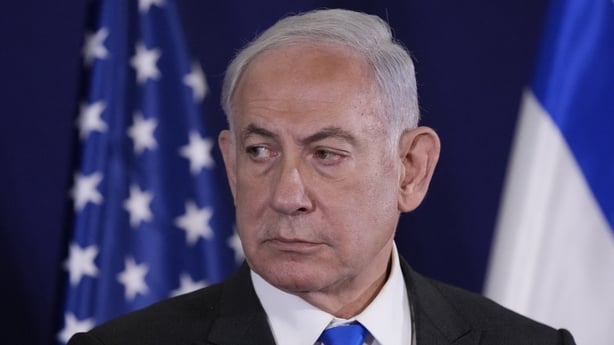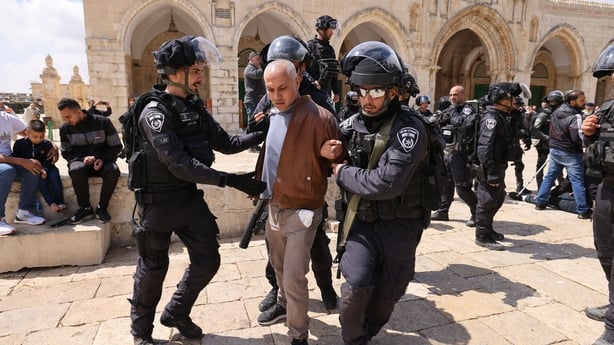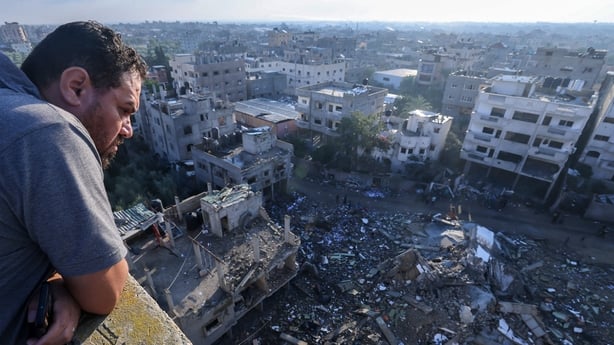The last two weeks have seen the centuries-long conflict between Israel and Palestine explode.
RTÉ previously reported on the historic - even ancient - sources of the conflict. That piece explains the centuries-old context, but to understand the basics of what happened in the last two weeks, you could do worse than start by looking at the early 2000s.
In 2000, significant talks were being hosted by US President Bill Clinton with Israeli and Palestinian leaders, and a long-hoped for peace deal seemed in sight. But at the last moment they collapsed.
"After that everybody shifts from the focus of 'let's create opportunities for cooperation, for conflict resolution,’ and everybody gets tough," said Professor Scott Lucas of University College Dublin.
A second Palestinian intifada, or uprising, began shortly after. It was markedly more violent than the first in 1987, with an estimated 4,000 Palestinian and 1,000 Israeli deaths.
The Intifada lasted until 2005. That same year, the Israeli government, led by Ariel Sharon, decided to pull Israeli settlements and forces out of Gaza.
"His cardinal mistake was that when he decided to disengage and to evacuate Gaza he didn't want to do it in coordination with the Palestinian Authority, with the Palestinian leader Mohmud Abbas," says Yossi Melman, an Israeli military and strategic affairs analyst and columnist with the Haaretz newspaper in Israel.
With Israeli forces gone, the question was; ‘who would control Gaza?’ and a Palestinian power struggle began.
Palestinian power struggle
After an election – the last in the enclave – Hamas, an Islamic militant armed group intent on the destruction of Israel, came to power.
A short-lived and bloody Palestinian Civil War followed, during which Hamas ousted the more secular Fatah from the enclave.
Hamas was in charge and has remained so ever since.
"All of a sudden, the Israeli government has got a group which is in charge in Gaza which now has enough influence to be saying, 'we don't believe that we can accept a two-state solution with Israel,'" said Professor Lucas.
In 2007, in conjunction with Egypt – which was concerned about Hamas's links with the Muslim Brotherhood group in Egypt – Israel imposed a permanent blockade on Gaza.
Since then, it has controlled Gaza’s coastline, airspace, and all the border crossings except the Rafah crossing in the south, which is managed by Egypt.
More than two million Palestinians inside the enclave of roughly 140 square miles have been reliant on Israel for electricity, food supplies, and on Israel and Egypt for permission to leave.
"Essentially nothing goes in or out [without permission], goods or people, it's very severely restricted," says Dr Yara Harawi, a Senior Analyst the Palestinian Policy Network.
Hamas coming to power in Gaza meant the governance of the two Palestinian Territories was split. It ruled blockaded-Gaza, while the internationally-recognised Palestinian Authority (PA), controlled by Fatah, oversaw the West Bank.
However, Israel doesn't recognise the borders of the West Bank and many political groups in Israel believe the land there should be part of Jewish State. The Palestinian Authority, riven by corruption and conflict with Hamas, struggled to rally support for its policies and stances.
West Bank Control
While on paper the Palestinian Authority governs the West Bank, within the territory Israel asserts control and occupies a huge area. Known as Area C, it is largely off limits to Palestinians for what Israel says are security reasons.
"There is this idea that the West Bank is an autonomous area, that the Palestinian Authority has control over this area. But it's really not true," Dr Hawari said.
"Area C is 60% of the West Bank and the Israeli army actually controls all the exits and entrances, all the borders, and they can set up checkpoints whenever they like."
At the same time, Palestinians and their leaders in the West Bank have been trying to deal with a continuously growing movement of ultra-Orthodox Jewish people have been moving into areas of the West Bank to live in settlements.
These are located on what is considered under international law to be Palestinian territory, and have been built in contravention of international – and sometimes, Israeli – law.
"[The settlers believe] it was given to the Jews by God, and therefore the Palestinians in the West Bank, should be either expelled or live with citizens without rights, without political rights," says Yossi Melman.
Such extreme views are a minority in Israel but have gained disproportionate influence in politics recently, through junior partners in the current coalition government.
Israeli politics
Prime Minister Benjamin Netanyahu has been propped up by ultra-nationalist Zionist parties whose core support base is among settlers.

The formation of the coalition a year ago coincided with a further increase in violence between Israeli and Palestinian communities in the West Bank, as Israeli government ministers led marches to illegal settlements.
In August, before this most recent escalation, the United Nations said more than 200 Palestinians and nearly 30 Israelis had been killed in the occupied West Bank and Israel this year, the highest level of violence since 2005.
Tension has been further exacerbated by recent visits to the Al-Aqsa Mosque compound by Israeli ministers and members of ultra-nationalist groups.
The Al-Aqsa compound in the Old City of Jerusalem has long been a flashpoint for violence over matters of sovereignty and religion. It is the location of key holy sites in Islam and Judaism alike.
Under longstanding "status quo" arrangements governing the area, non-Muslims can visit but only Muslims are allowed to worship in the mosque compound.
However, certain hardline Israeli Jewish groups promote the destruction of the Al-Aqsa Mosque and the construction of a Jewish temple in its place, and have more or less openly breached the status quo agreements.
"That's why when ministers enter the Al Aqsa compound with a huge group of armed security personnel, it’s seen as a massive provocation," says Dr Hawari.

Beyond tension with Palestinians, the coalition government has also faced major internal protests over Prime Minister Netanyahu’s support for these hardline groups, its approach to the judiciary and military, and faced accusations the policies its ministers were pursuing undermined Israel’s democracy.
Large-scale anti-government protests had been a weekly occurrence in Israel prior to the recent Hamas attack.
"The protest movement in the last ten months, many, many posters and many, many slogans were aimed first of all against Netanyahu," Mr Melman said. "There is a strong sentiment that [his government] wants to ruin Israel, to change Israel, to deprive Israel of its liberal values."
Mr Melman and others say the growing Palestinian-Israeli tension, political protests, and violence in the West Bank, caused the focus of the Israeli security forces to shift over recent months and years, towards the West Bank and away from Gaza.
"Almost half of the Israeli conscript army of 100,000 to 200,000 thousand soldiers - more or less half of it was engaged in kind of policing tasks, to police the West Bank to protect the Jewish settlements," says Mr Melman.
All the while Gaza remained relatively quiet, but Hamas was developing its plan.
Israeli security services interpreted the actions of Hamas in recent years as indicating it was interested in building the economy, health services and infrastructure in Gaza, not entering another round of hostilities with Israel.
"In the last two years, a smaller group which is operating in Gaza, the Palestinian Islamic Jihad, which is even more radical [than Hamas] did attack Israel on numerous occasions with rockets," says Mr Melman.
"And Israel responded. But Hamas did not intervene, did not rush to help their Palestinian brother."
On 7 October that changed.
The most recent attacks
Thousands of Hamas fighters breached the Gaza border with Israel in multiple locations. Using drones and rockets, they took out Israeli surveillance towers and overran military posts.
"It's different this time because Hamas we're going to go in and we're going to make a show of this in terms of what we can do to the Israelis," said Professor Scott Lucas.
"They go into the civilian settlements, they go into the Kibbutzim, they go into gatherings such as the music festival and they carry out mass murder. It's not an accident. This is not hitting a military target. This was hitting unarmed civilians."
Hamas named the operation 'Al Aqsa Floods' after the mosque in Jerusalem.
More than 1500 Israelis are known to have been killed in the attack, with dozens more having been taken hostage.
"I think it's the heaviest blow in the history of Israel. It's the biggest, biggest military defeat in Israeli history," Mr Melman said.
In response to the Hamas attacks, Israel launched air strikes on hundreds of locations in Gaza, flattening homes, killing thousands and displacing hundreds of thousands.
It also cut off power and water supplies to the enclave.

Unquestionably, Israel – a state built on projecting strength to hostile neighbours - has been stunned.
"It was the shock and the trauma that Hamas was capable to launch such a well-coordinated, well-organised, well-planned attack using paragliders drones, naval commandos and invasion by land with vans and motorcycles. And everything was under the cover of heavy rocket shelling," Mr Melman said.
There are questions now for Israeli authorities and politicians as to how this could happen, and how its much-vaunted intelligence services failed to prepare for such a large and multi-faceted attack.
"The [Israeli] intelligence was reputable to be one of the best, if not the best in the world...and suddenly everything collapsed," Mr Melman said.
"This is hubris, the Israeli hubris, the military intelligence hubris...Israel believed that Hamas is weak."
Israeli response
In the meantime, the Israeli military has been preparing a longer-term response.
On Friday morning, it ordered one million residents in northern Gaza to evacuate to areas south of Wadi Gaza, a stretch of wetlands in the centre of the enclave, which many perceived as a sign an Israeli ground invasion was looming.
The UN and other organisations called on Israel to cancel the evacuation order, calling it "a crime against humanity and a blatant violation of international humanitarian law."
Gaza is home to more than two million people, half of whom are children. The key Erez crossing into Israel is closed and the Rafah crossing into Egypt has been bombed by Israeli forces and is not currently operating.
Refugees and aid organisations say innocent Palestinian civilians have been trapped, in what has become a war zone.
On Tuesday, hundreds of Palestinians were feared dead in a strike on a hospital, which was being used a shelter, in Gaza. The health ministry in Hamas-run Gaza said Israel was responsible for the airstrike, which Israel denied.
Juliette Touma from the UN's Relief and Works Agency for Palestine Refugees (UNRWA) told Prime Time on Tuesday night that one of their shelters had also been hit earlier that day.
"No place is safe in Gaza anymore," Ms Touma said.
The UNRWA have been unable to deliver aid for days and supplies, including drinking water, within Gaza are running out, she said.
"It's just a matter of time that waterborne diseases are going to start spreading including our children," Ms Touma said.
"Time is running out and it's running out fast...people continue to be killed in Israeli forces’ bombardments and airstrikes and people are dying of other causes because of the lack of essential supplies in the Gaza Strip."
Regional war
If Israel does move to enter Gaza, that will raise the prospect of a regional war. Iran has said that any entry into Gaza will be met with a response. It is understood to provide finance, weapons and other supports to Hamas.
On Israel’s northern border, another Iranian-backed militant group, Hezbollah, operates in southern Lebanon.
"Hamas is not [Iran's] puppet, but as a group with whom they share common aims to contain, to undercut Israel, they collaborate," Professor Scott Lucas from University College Dublin’s Clinton Institute said.
"There have been recurrent wars between Hezbollah and Israel that have taken place and so the possibility of a second front is live, including one that Iran is supporting, which is why the US, and now other countries are moving military forces into the Mediterranean as a sign of deterrence," Prof Lucas said.
In what appears to be an intractable situation, hope is scarce. Hamas has called on Palestinians to remain in Gaza, despite the potential for a ground war.
There are demands for the opening of a safe passage into Egypt, but many feel such a prospect is unlikely.
"Egypt's not going to allow that. Egypt puts its own security consideration above that of Gazans," Prof Lucas says.
As a result, potential solutions are hard to find.
"I'm not sure how we get there, but the agreed position has got to be that Hamas has got to go as the leadership in Gaza, but Netanyahu has got to go in Israel," Prof Lucas said.
Like a lot of things in this conflict, getting to the agreed position is complex and difficult. But the absence of any such agreement is cutting short people’s lives.
In a conflict lasting one hundred years, if not two thousand, it seems these few weeks might – horrifyingly - stand out.
